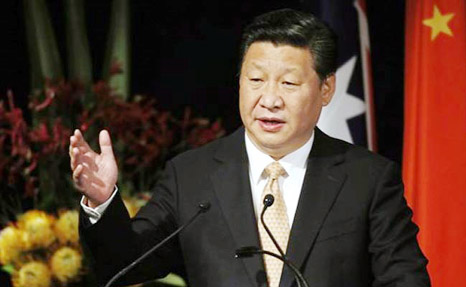
AFP, Beijing :
China’s ruling Communist Party declared its General Secretary Xi Jinping the “core” of its leadership on Thursday, elevating his already powerful status.
A communique issued by top party leaders after a four-day meeting in Beijing called on all its members to “closely unite around the CPC Central Committee with Comrade Xi Jinping as the core”, said the People’s Daily, the party’s official mouthpiece.
The announcement followed a gathering of 400 top party leaders in Beijing for a meeting known as the Sixth Plenum to discuss changes to party structure and discipline.
Scenes of the meeting shown on state broadcaster CCTV showed a relaxed but business-like Xi, clad in a black windbreaker, lecturing a ballroom of rapt party members.
He has sought to bend the party to his will since taking its helm in 2012, and has already taken control of more levers of power than any leader since Mao Zedong.
Regional cadres began using the term “core” for Xi last December, but it then disappeared, suggesting that the Chinese president had encountered resistance to his efforts to further consolidate his power.
Analysts have speculated that Xi could seek to stay in power beyond the traditional 10-year term. The declaration was “very significant”, said Willy Lam, professor of politics at the Chinese University of Hong Kong, because in Chinese politics the “core” has traditionally denoted a degree of individual authority unconstrained by term limits. “The core of leadership can last forever,” he said. “There’s no idea of tenure, retirement age associated with the core.”
China has a constitutional limit of two five-year terms for the national president, another of Xi’s titles, but no formal rule on tenure for the general secretary of the ruling party, the post from which he derives his power.
Deng Xiaoping, the economic reformer who was China’s paramount leader throughout the 1980s and into the 1990s, was referred to as the “core” of the leadership.
But his successor Jiang Zemin was only called the core of the third generation of leaders, effectively limiting the duration of the description, Lam said. Xi’s immediate predecessor Hu Jintao never achieved the status.
The plenum confirmed that the Communist party will hold a congress late next year, when a new politburo standing committee, its most powerful body, will be selected, giving Xi an opportunity to promote favoured allies.
Xi’s elevation comes as he exerts increasing pressure on the party to clean up its act. Since coming to power, he has presided over an anti-corruption campaign that has punished more than one million officials in what some say resembles a political purge.
The drive has eliminated potential rival bastions of power, but it has also laid waste to the party’s organisational chart, paralysing grass-roots bureaucrats petrified of making a mistake, a problem compounded by unclear and contradictory signals on what policies to pursue.
China’s ruling Communist Party declared its General Secretary Xi Jinping the “core” of its leadership on Thursday, elevating his already powerful status.
A communique issued by top party leaders after a four-day meeting in Beijing called on all its members to “closely unite around the CPC Central Committee with Comrade Xi Jinping as the core”, said the People’s Daily, the party’s official mouthpiece.
The announcement followed a gathering of 400 top party leaders in Beijing for a meeting known as the Sixth Plenum to discuss changes to party structure and discipline.
Scenes of the meeting shown on state broadcaster CCTV showed a relaxed but business-like Xi, clad in a black windbreaker, lecturing a ballroom of rapt party members.
He has sought to bend the party to his will since taking its helm in 2012, and has already taken control of more levers of power than any leader since Mao Zedong.
Regional cadres began using the term “core” for Xi last December, but it then disappeared, suggesting that the Chinese president had encountered resistance to his efforts to further consolidate his power.
Analysts have speculated that Xi could seek to stay in power beyond the traditional 10-year term. The declaration was “very significant”, said Willy Lam, professor of politics at the Chinese University of Hong Kong, because in Chinese politics the “core” has traditionally denoted a degree of individual authority unconstrained by term limits. “The core of leadership can last forever,” he said. “There’s no idea of tenure, retirement age associated with the core.”
China has a constitutional limit of two five-year terms for the national president, another of Xi’s titles, but no formal rule on tenure for the general secretary of the ruling party, the post from which he derives his power.
Deng Xiaoping, the economic reformer who was China’s paramount leader throughout the 1980s and into the 1990s, was referred to as the “core” of the leadership.
But his successor Jiang Zemin was only called the core of the third generation of leaders, effectively limiting the duration of the description, Lam said. Xi’s immediate predecessor Hu Jintao never achieved the status.
The plenum confirmed that the Communist party will hold a congress late next year, when a new politburo standing committee, its most powerful body, will be selected, giving Xi an opportunity to promote favoured allies.
Xi’s elevation comes as he exerts increasing pressure on the party to clean up its act. Since coming to power, he has presided over an anti-corruption campaign that has punished more than one million officials in what some say resembles a political purge.
The drive has eliminated potential rival bastions of power, but it has also laid waste to the party’s organisational chart, paralysing grass-roots bureaucrats petrified of making a mistake, a problem compounded by unclear and contradictory signals on what policies to pursue.

